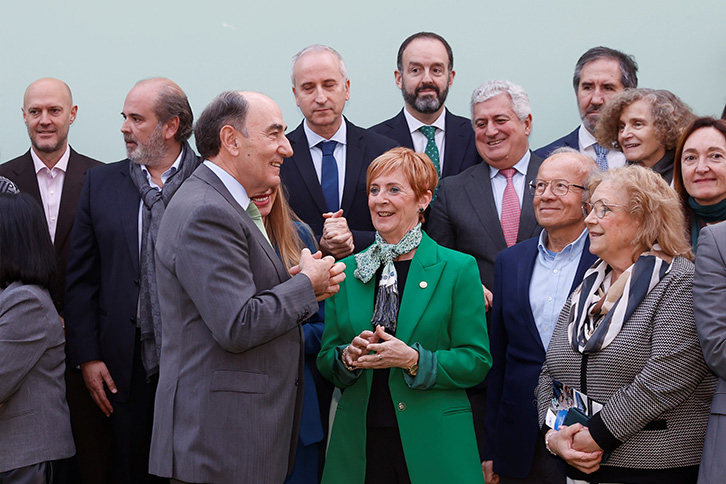Iberdrola Q-Cero: Over 40 Companies Unite for Thermal Demand Decarbonization in Spain

|
Listen to this story:
|
“This is a real partnership to decarbonise and seize new opportunities. Many companies also share this commitment, and that is why we are reaching agreements among ourselves and with the financial sector to achieve the goal of a three-fold increase in clean energy.” – Ignacio Galá, Executive Chairman of Iberdrola
- The initiative aims to accelerate the decarbonisation of thermal demand in industry and buildings in order to reduce CO2 emissions and combat climate change and to seize economic and employment opportunities.
- The partnership aims to provide clarity on the current situation, move forward, identify barriers and solutions in the different sectors and establish processes over the next two years to make faster progress.
More than 40 companies took part in the launch event of Q-Zero, the alliance for the decarbonisation of thermal demand in Spain, organised today at Iberdrola’s headquarters. The initiative, open to all agents, was created as a meeting and dialogue point to accelerate decarbonisation, especially of thermal energy demand in both the industrial and building sectors, and to combat climate change.
The partnership, facilitated and supported by the Centre for Innovation in Technology for Human Development of the Polytechnic University of Madrid, has today brought together all sectors of the industrial economic chain.
The current pace of decarbonisation in the industrial and building sectors is below the pace needed to achieve the commitments made in the fight against climate change, and to limit global warming to 1.5 degrees Celsius.
The alliance is conceived as a common place open to all actors where all entities come together, discuss the current situation, identify bottlenecks and develop proposals and activities to accelerate the electrification of heat in the different sectors, maintaining competitiveness and taking advantage of and contributing to realising the opportunities of the energy transition.
The electrification of heat is a sector with special particularities, as although there are numerous barriers common to all businesses, there are also significant differences. This reality poses challenges for the acceleration of the process of decarbonisation of thermal demand, and at the same time an economic opportunity to develop new markets and decarbonisation technologies in Spain.
Iberdrola Chairman Ignacio Galán said at the launch of the Alliance that “there is a real urgency to change our energy system. We need it to protect our environment, but also to increase our energy autonomy and reduce fossil fuel imports. This is a real partnership to decarbonise and seize new opportunities. Many companies also share this commitment, and that is why we are reaching agreements among ourselves and with the financial sector to achieve the goal of a three-fold increase in clean energy.”
Galán also wanted to “thank the workers of all the companies that form part of this alliance for their commitment to building a more fraternal, equitable and sustainable world, and of course, one that is less polluted for everyone, where Spain has a unique opportunity. The social clamour and the political consensus demand it”.
The companies and entities that participated in the launch of the alliance were Abadía Retuerta, Ábbatte, AFEC, AndreuWorld, Antolín, AQ Compute, Bayer, bp, Carbon2Nature, Castillo de Canena, Contazara, Crimidesa, Disalfarm, EIT Climate KIC, Ence – Energía y Celulosa, Estrella Levante (DAMM Group), Fagor Ederlan, Ferrovial, Gonvarri Solar Steel, Google, Heineken, Holcim, Iberdrola, Kyoto, Lactalis, Latem Aluminium, Losán, Masam, Merlin Properties, Molecor, NetZero Basque Industrial Super Cluster, Pepsico, Plastic Energy, Porcelanosa, Rebi, Sabic, SpainDC, T500 Puratos and Tubos Reunidos Group.COUNTRY OPPORTUNITY
The alliance is in line with the European Union’s fight against climate change and its goal for all member countries to reduce their greenhouse gas emissions by at least 55% by 2030.
The demand for thermal energy accounts for approximately 40% of final energy demand in Spain. This demand is divided approximately equally between industry and heat needs in buildings, including the residential and tertiary sectors.
The weight of industry is decreasing in Europe and is particularly low in Spain. Its dependence on fossil fuels, the energy crisis and the lack of energy autonomy, among other variables, are increasing energy costs, affecting competitiveness.
Related Article: ADNOC commits $23 billion for Decarbonization Projects, Technologies and Lower-carbon Solutions
Compared to other countries, Spain has the competitive advantage of having the best renewable resources in Europe. On the path towards a carbon-free energy transition and security of supply at stable prices, Spain has abundant clean and competitive energy, which represents an enormous opportunity to attract industry to our country, generating employment and added value.










